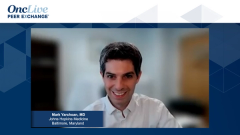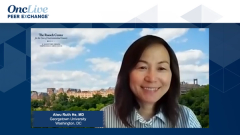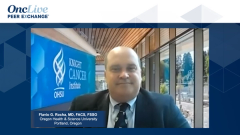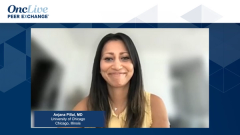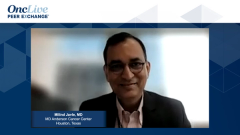
Novel Agents Being Explored in Advanced Biliary Tract Cancers
Expert panelists provide comprehensive insight on novel targeted agents being investigated in advanced biliary tract cancers.
Episodes in this series

Transcript:
Milind Javle, MD: I think that in the final few minutes we have left, I’m going to pick your brain about what you’re excited about in terms of what targets, or what therapies, or where do we go next here. Flavio, let me start with you. In the surgical setting, do you have anything that is particularly exciting to you?
Flavio G. Rocha, MD, FACS, FSSO: Yes. I wanted to mention that I know we’ve been talking about biliary tract cancer, but I think back to the discussion of lumping versus splitting. I’m very excited about the EA2197 trial. Just to remind the audience, this is a trial specifically for incidental gallbladder cancer. Patients are being randomized to either upfront surgery, which is the standard of care, versus perioperative gem/cis [gemcitabine and cisplatin]. This trial has been a long time coming. I must give credit to my colleague, [Shishir] Maithel, [MD,] who’s the PI [principal investigator]. It’s been a labor of love to get this pushed through with your support, Dr Javle, and others. This is the first trial specifically for gallbladder cancer in the NCCN [National Comprehensive Cancer Network], so I think that’s very exciting. We’re hoping to accrue patients and get the data. The second piece as I keep mentioning is also another neoadjuvant therapy. We mentioned the neoadjuvant therapy for our intrahepatic cholangiocarcinoma trial. We want to now, in the discussion of targeted therapy, move those agents perhaps up in that setting, where we can learn from the resected surgical specimens what is going on in the tumor microenvironment with these targeted agents. I think that will be the next step and evolution as we apply these in earlier settings. That’s what’s getting exciting in our world.
Milind Javle, MD: Thank you, Flavio. In terms of newer agents, Ruth, and Mark, some of the agents we talked about already. Then pathways I’m excited about for instance are for PARP inhibition, and ATR inhibition. Some novel HER2 agents, for instance ... has completed a phase 2 trial. Recently there were very exciting results with HER2 ADCs [antibody-drug conjugates] in breast cancer. Perhaps these are targets to consider. There are ongoing trials in this space. There’s one with CPI-613, surufatinib, CTX-009. Ruth, are there certain pathways or targets that you see in the short term, some in the long term?
Aiwu Ruth He, MD: We had a phase 2 study testing the olaparib/pembrolizumab in cholangiocarcinoma. I do believe there are patients with BRCAness phenotype in cholangiocarcinoma. It’s not just the BRCA mutation; there are other additional mutations that are of the same pathway, and some of those patients do benefit from PARP inhibition. It’s interesting, I think there’s an added mechanism behind it, and some patients with the mutation do not respond. But we have seen very durable response in some patients with BRCAness phenotype. That needs to be further looked at. I know there is some intergroup study evaluating this further. I’m excited about finding more information about this pathway.
Milind Javle, MD: Thank you. Mark or anybody else, can you pitch in anything else that you’re looking forward to?
Mark Yarchoan, MD: I think the field of FGFR2 inhibitors is quite exciting. We have our first 2 approvals with pemigatinib and infigratinib. But often when these drugs are used over time, we see the emergence of resistance mutations in either the gatekeeper or the molecular break. I think we have next-generation FGFR2 inhibitors in development that overcome some of the resistance to the first generation of inhibitors, so those are drugs that I think are worth watching that may be transformative. There are several VEGF-targeted agents in development for cholangiocarcinoma. Personally, I’m a little skeptical because ramucirumab did not appear to have any activity in cholangiocarcinoma in a randomized trial, so it’s a little hard for me to imagine that this is going to be transformative, but I’m happy to be wrong, and I hope I am.
I think the HER2 space is something exciting to watch. There’s a bispecific antibody targeting HER2 and HER3 that I think you probably know more about that anybody, Milind. There are some data in HER2, which of course is an ADC in breast cancer that was studied in cholangiocarcinoma. I think the caveat there is that there were a number of pulmonary adverse events that were observed at a much higher rate than I think we would have anticipated from the breast cancer literature, so I don’t know whether that’s going to be feasible in biliary tract cancer. There’s a lot to watch. I’m happy to hear other thoughts.
Milind Javle, MD: Mark you’re always on the spot. I just must speak up for my colleague…ramucirumab was a negative study when combined with pembrolizumab. He had a single-agent study that was published in CCR [Clinical Cancer Research] a few months ago, and it's similar to gastric cancer with AVAGAST being a negative phase 3 trial, but he had ramucirumab. But anyway, I agree, the overall benefit of all of these agents, VEGF agents, should be quite modest.
Transcript edited for clarity.


